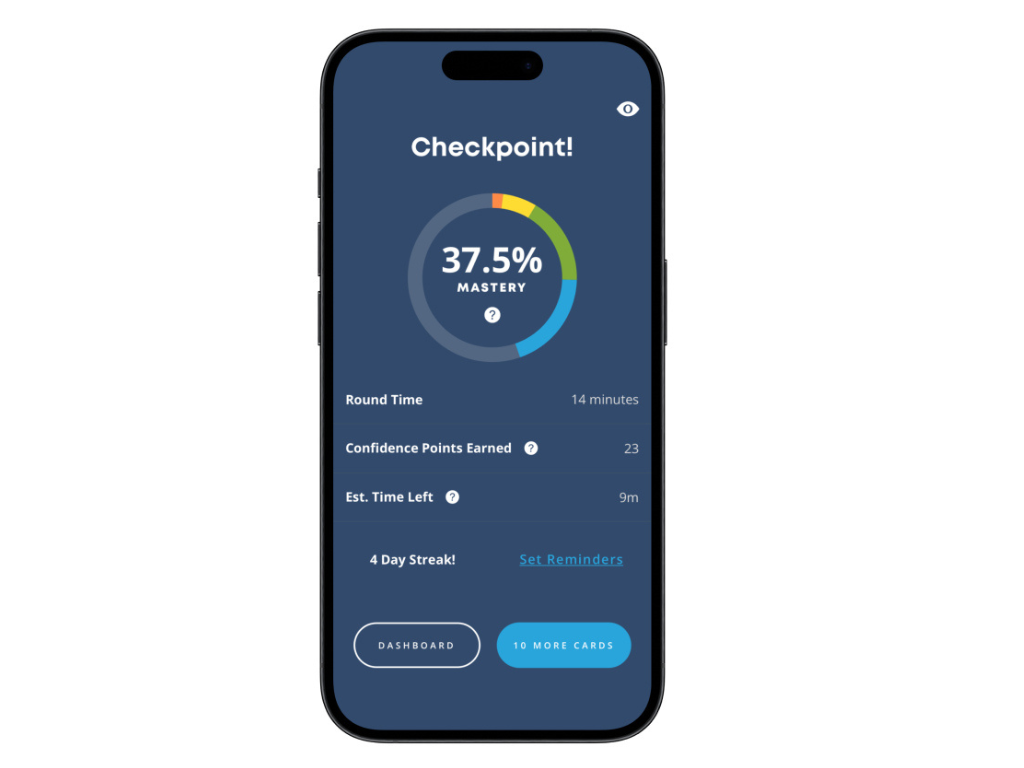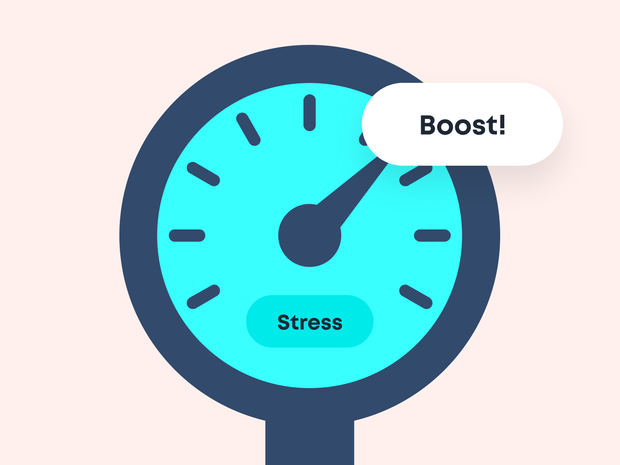Imagine you’re wandering through a prehistoric swamp, minding your own business, when—snap!—a saber-toothed tiger lunges from the undergrowth. Your heart pounds, your senses sharpen, and your adrenaline surges. Congratulations: you’ve just experienced the body’s stress response in action.
Fast forward a few million years, and you’re facing a midterm instead of a mammoth. But your body? It reacts the same way. The good news? That primal burst of stress can actually help you perform better—if you know how to channel it. Let's break down how to turn your exam anxiety into a superpower.
Understand the Stress Response
Stress isn't always bad. In small doses, it boosts focus, sharpens memory, and gives you the energy to rise to a challenge. But chronic stress? That’s where things start to fall apart—causing memory lapses, low energy, and even digestive problems.
That’s why the key to exam prep isn’t avoiding stress altogether. It’s managing it strategically so it powers your performance instead of short-circuiting it.
Step Into the Stress Lab: Brainscape’s 9-Step Formula
1. Reflect & unpack. Identify what’s stressing you out without judgment. Write it down or talk it out.
2. Chase it down the rabbit hole. Ask yourself: Why am I stressed? Keep going until the monster shrinks into something manageable.
3. Get perspective. One bad grade isn’t the apocalypse. You’re more than your GPA, we promise.
4. Put it on paper. Name your stressors and divide them into things you can control vs. those you can’t.
5. Make a plan. Break big stressors into bite-sized actions. Structure = clarity = less stress.
6. Study smart with Brainscape. Brainscape is the ultimate study weapon—an adaptive flashcard platform that uses spaced repetition and metacognitive feedback to help you learn faster, remember longer, and study more efficiently. Whether you’re brushing up on biology or battling the bar exam, Brainscape turns chaotic content into crystal-clear knowledge.

7. Reframe fear as excitement. Your stress might just be adrenaline in disguise. Get pumped—it’s go time.
8. Move your body. Exercise floods your brain with endorphins, boosts memory, and helps you sleep better. Go walk, dance, or punch a pillow—whatever works.
9. Practice gratitude. A few minutes of feeling thankful can rewire your brain to stay calm and positive—even under pressure.
FAQ: How to Use Exam Stress to Improve Performance and Prevent Burnout
How can I manage stress during exams?
Start by recognizing that stress can actually be useful. It sharpens focus and boosts performance when harnessed correctly. To manage it effectively, identify your stress triggers, create a clear plan of action, and use efficient study tools to reduce overwhelm. Regular movement, positive self-talk, and gratitude practices can also help regulate your emotions and keep you grounded.
How to not get burnt out during exams?
Burnout often happens when you overwork without proper rest or direction. Prevent it by studying smarter, building breaks into your schedule, and pacing yourself with realistic goals. Tools that track your progress and adapt to your needs (like Brainscape) can help keep you motivated without pushing you to the brink.
How to avoid a nervous breakdown during exams?
A nervous breakdown usually stems from unchecked stress piling up. To avoid it, practice regular self-awareness and stress reflection. Reframe anxiety as excitement, prioritize sleep and movement, and use routines that ground you. Preparing well in advance and breaking your workload into smaller, achievable chunks can also restore your sense of control.
Your Stress Isn’t the Enemy. It’s the Fuel.
You don’t need to eliminate stress to succeed—you need to harness it. Understanding your stressors, building a plan, and using tools like Brainscape to study smarter can completely flip the script on your exam experience. Instead of spiraling into panic, you stay grounded, focused, and in control.
When you pair stress management with strategic prep, your brain stops flailing and starts firing. So breathe. Stretch. Then, load up Brainscape and start racking up those knowledge points, one flashcard at a time. You’ve got everything you need to crush this.
Because with the right mindset and the right tools, you’re not just studying. You’re becoming unstoppable. Brainscape isn’t just a flashcard app. It’s the ultimate study weapon.
Additional Reading
- The connection between water & stress: Dehydration and anxiety
- Optimize Your Brain Health for Effective Studying
- No time to study? Online flashcards can help you accomplish the impossible
References
American Psychological Association. (2023, March 8). Stress effects on the body. https://www.apa.org. https://www.apa.org/topics/stress/body
Anxiety and Depression Association of America. (2022, October 28). Physical activity reduces stress. ADAA. https://adaa.org/understanding-anxiety/related-illnesses/other-related-conditions/stress/physical-activity-reduces-st
Chowdhury, M., & Smith, W. (2024, July 26). The neuroscience of gratitude and effects on the brain. Positive Psychology. https://positivepsychology.com/neuroscience-of-gratitude/
Clay, R. (2011, January). Stressed in America. https://www.apa.org. https://www.apa.org/monitor/2011/01/stressed-america/
Ellin, A. (2012, April 13). Do Grades Matter? The New York Times. https://www.nytimes.com/2012/04/15/education/edlife/do-grades-matter.html
Harvard Health. (2020, February 19). Harnessing the upsides of stress. https://www.health.harvard.edu/mind-and-mood/harnessing-the-upsides-of-stress#:~:text=Don't%20deny%20the%20stress,Caring%20creates%20resilience.
HEPI. (2019, August 13). Why employers don’t care about qualifications. Higher Education Policy Institute. https://www.hepi.ac.uk/2019/08/14/why-employers-dont-care-about-qualifications/
Kim, E. J., Pellman, B., & Kim, J. J. (2015). Stress effects on the hippocampus: a critical review. Learning & Memory, 22(9), 411–416. https://doi.org/10.1101/lm.037291.114
Korb, A. (2014, October 31). Predictable Fear. Psychology Today. https://www.psychologytoday.com/us/blog/prefrontal-nudity/201410/predictable-fear
OxfordAQA. (2023, October 3). Understanding the stress response in exams - What happens in your brain? OxfordAQA International Qualifications. https://www.oxfordaqa.com/news/understanding-the-stress-response-in-exams-what-happens-in-your-brain/#:~:text=It%20does%20this%20by%20releasing,more%20oxygen%20to%20the%20brain
Ratey, J. J., & Hagerman, E. (2008). SPARK: the revolutionary new science of exercise and the brain. http://ci.nii.ac.jp/ncid/BA9124379X
Rentala, S., Thimmajja, S. G., Tilekar, S. D., Nayak, R. B., & Aladakatti, R. (2019). Impact of holistic stress management program on academic stress and well-being of Indian adolescent girls: A randomized controlled trial. Journal of Education and Health Promotion, 8(1), 253. https://doi.org/10.4103/jehp.jehp_233_19
The Economist Newspaper. (2024). GMAT and GRE tutor. Economist Education. https://education.economist.com/gmatgre
